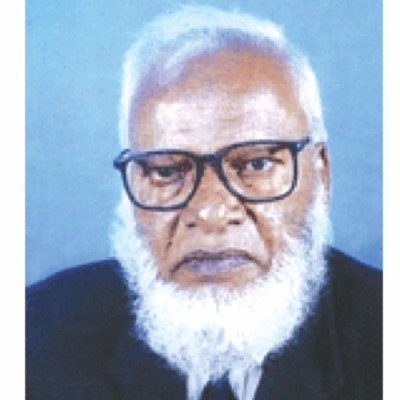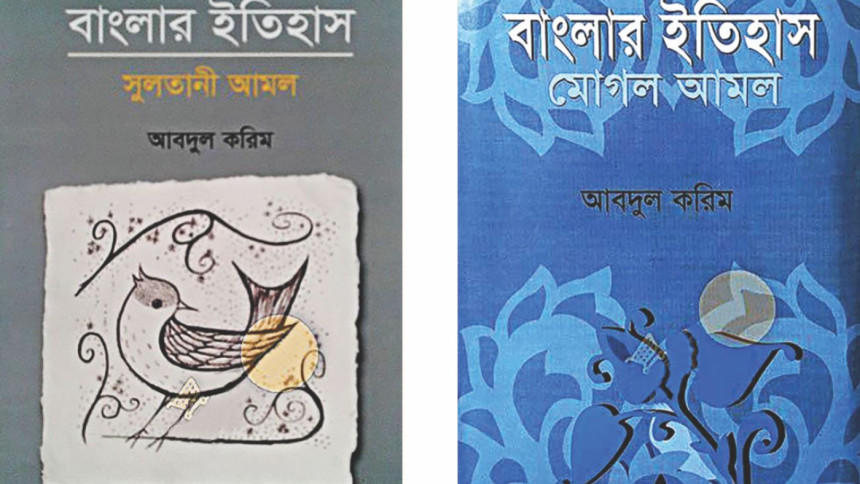Professor Abdul Karim: Remembering a great historian

Abdul Karim was born in Banshkhali, Chittagong on June 1, 1928. He passed his school final in 1944 and intermediate in 1946 from Islamic Intermediate College, currently Haji Muhammad Mohsin College. He earned his BA Honours (1949) and MA (1950) in History from the University of Dhaka. He started his career as a teacher at Rupganj Victoria High School, Naryanganj, where he began his research in history, at the very outset of his joining.
Abdul Karim started to collect material for research by roaming around Sonargaon, the historical place famous for Isa Khan, the Muslim chief who led the Baro Bhuiyans. The style of Abdul Karim's search for materials is comparable with that of Vincent Smith, ICS (1848–1920). This British Indologist, art historian and civil servant was known to always keep himself busy in collecting historical material wherever he was posted. It is said that he had a strong fascination for ancient structures of the early age, and he tried to imbibe the essence of history even from a piece of old brick. Abdul Karim was exactly the same—a person with an indomitable thirst for historical research.
In 1951 he joined the History department of the University of Dhaka as lecturer. He obtained his first PhD from the University of Dhaka in 1958 on "Social History of the Muslims in Bengal," with the eminent archaeologist Professor AH Dani as his supervisor. Then in 1963, Abdul Karim received his second PhD from SOAS, University of London as a commonwealth scholar. The dissertation, this time, was "Murshid Quli Khan and His Times." Both of his theses were published by the Asiatic Society.

For fifteen years he served as a very competent teacher and researcher at the University of Dhaka. Abdul Karim left Dhaka University in 1966 and joined the then newly established Chittagong University as a reader in the Department of History. Later on, he became the fifth Vice Chancellor (1975–1981) of the University of Chittagong.
In his lifetime, Abdul Karim authored about forty books in Bengali and English and also published innumerable research articles on the history of Bengal. Being a student of madrasa background, he was very proficient in Persian and Arabic, which helped him to excavate and investigate original source materials of medieval history. His language skills also made him a master in interpreting Muslim coins and inscriptions.
As a result, most of Abdul Karim's research work was based on first hand primary sources. His contributions to the history of medieval Bengal were absolutely original. For this, he attained prominence at home and abroad rapidly. He was awarded the Ekushey Padak in 1995 for his outstanding contribution to historical research.
Abdul Karim's research focussed on the history of medieval Bengal. To construct the social and political history of medieval Bengal, he collected material from Arabic and Persian texts, coins and inscriptions, biographies of Sufi-saints and from the ocean of medieval Bengali literature.
Paucity of source material did not disappoint Abdul Karim from his journey towards medieval Bengal. After reviewing innumerable coins of Muslim rulers, Karim penned his Corpus of the Muslim Coins of Bengal, for which he was awarded the Akbar Silver Medal by the Indian Numismatic Society. The outcome of his relentless research on inscriptions became the Corpus of the Arabic and Persian Inscriptions of Bengal. When Professor Karim was Vice Chancellor of Chittagong University, he produced the Catalogue of Coins in the Cabinet of the Chittagong University Museum. Bangla Sahityer Kalokrom–Moddhojug was the result of his vast work on medieval Bengali literature.
Dacca: The Mughal Capital was another of his ground-breaking work. During data-mining for this, he had to learn the Dutch language in London. In addition to his second PhD thesis, he wrote "Dhakai Muslin", the original research on the history of the Muslin industry in Bengal, during his stay in London. But, according to some researchers, Banglar Itihash: Sultani Amal is one of the most fundamental works of Professor Karim. As a fellow of the IBS, Rajshashi University, he published History of Bengal: Mughal Period in two volumes.
In fact, it is impossible to delineate a complete picture of Karim's academic production in such a small canvas. But his contribution was not only to research but also as a teacher. Because of his incredible command on the subject matter, even tough and uninteresting courses such as "The Constitutional History of England" would turn into a most interesting subject in his classroom. How does one become a good teacher? In answer to this question by Professor Mahmudul Huq of Chittagong University, Professor Karim once said that to be a successful teacher, one has to attain mastery on the subject matter; and to achieve that, a teacher should study at least forty-five hours for taking a class of forty-five minutes.
I asked him the same question when I joined university teaching in 2003. "Now it is impossible," he replied. "Where will you get my Mohar Ali? Without Mohar Ali, nobody can be a good teacher." Mohar Ali, one of his students in the early days of his teaching, always asked him questions in the classroom one after another. Karim answered him but Mohar Ali increased the number of questions gradually. Karim took it to be a plot devised by his colleagues, and asked him whether it was so. Mohar replied in the negative and added that he took it as a challenge to go beyond the number of books Karim went through to discuss a topic. So, to face Mohar Ali's challenge in the classroom, Karim had to study a lot. This Muhammad Mohar Ali, who was a brilliant student according to Professor Karim, later became a famous historian.
Professor Karim was an authority of the field of medieval Bengal and could recognise from a distance if a mosque was from the Sultani or from the Mughal period. He never maintained any diary but aided by his sharp memory, at his old age he wrote his biography, Somaj O Jibon, in two volumes. This will surely remain a constant source of inspiration for researchers, teachers and general readers for years to come.
Professor Karim's work remains as suggested texts in many prominent universities across the world. In his lifetime, despite opportunities of publishing his books from famous publishing houses of the western world, he published all of them from Bangladesh. His argument was that books published from foreign reputed publishers, being so expensive, always remain out of the reach of our researchers and readers. He did not deprive our readers of enjoying our own history. Professor Abdul Karim died on July 24, 2007 leaving behind a treasure trove of history for other historians.
Mohammad Zahidur Rahman teaches history at Chittagong University.
Email: zahidhistory@gmail.com






Comments